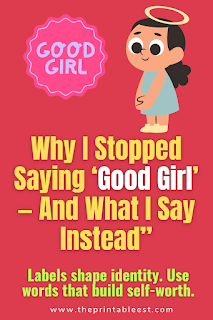How Labels Can Unintentionally Shape Identity — And What to Say Instead
We say it with love. With pride. With the best intentions.“You’re such a good girl!”
“What a good boy—thank you for helping!”
But what if this common phrase—echoed in classrooms, playgrounds, and dinner tables—is actually doing more harm than we realize?
In this post, we’ll explore:
- Why phrases like “good girl” and “good boy” can be problematic
- How they impact identity and emotional regulation
- What to say instead (without sounding robotic or overthinking every sentence)
- And how to build intrinsic motivation and self-worth that lasts
❤️ The Intention Is Love — But the Impact Can Be Confusion
Let’s be clear: When we say “good girl” or “good boy,” we’re not trying to harm our kids.
We’re often trying to express:
- Approval
- Gratitude
- Joy
- Connection
But here’s what children may hear instead:
“I’m good when I do what adults like.
If I don’t… does that mean I’m bad?”
These labels—though well-meaning—can tie worthiness to behavior, especially in young children still forming their sense of self.
🧠 What Happens When Praise Becomes a Label
Research in developmental psychology shows that label-based praise can:
- Undermine intrinsic motivation
- Lead to people-pleasing behaviors
- Create fear of making mistakes (“If I’m not good today, will I lose love?”)
- Blur the line between being good and doing something good
And for some kids (especially sensitive ones), this can lead to:
- Shame when they make a mistake
- Avoidance of risk (“If I try and fail, I won’t be ‘good’ anymore”)
- Anxiety around adult approval
💬 It turns praise into pressure.
🚸 “Good” for What? And for Whom?
Let’s look at a few examples:
- A child sits quietly during dinner: “What a good girl!”
- A child shares a toy: “You’re such a good boy!”
- A child apologizes: “That was very good of you.”
In each case, the child is being told their behavior equals goodness.
But what happens when:
- They speak up instead of sitting quietly?
- They don’t want to share yet?
- They’re not ready to apologize?
Are they suddenly… bad?
✅ What to Say Instead (That Still Feels Natural)
The goal isn’t to strip all joy from your language or overthink every sentence.
It’s to be more specific, supportive, and behavior-focused rather than identity-focused.
Swap: “Good girl!”
✅ Try:
- “You waited so patiently—thank you.”
- “I really appreciate how gentle you were just now.”
Swap: “Good boy for helping!”
✅ Try:
- “That was so kind and thoughtful of you.”
- “Helping your sister with her shoes showed a lot of care.”
Swap: “You’re such a good listener.”
✅ Try:
- “You listened carefully and waited your turn—that really helped.”
- “I noticed how focused you were when I was talking. That felt respectful.”
🧠 Why This Works: Shifting From Identity to Impact
Instead of reinforcing “You’re good because you did this,”
…you’re saying, “What you did had a real, meaningful effect.”
This builds:
- Empathy
- Self-awareness
- Internal motivation (“I help because I care,” not “because I’m a good boy”)
- Resilience (because worth isn’t fragile or conditional)
💬 When You Catch Yourself Saying It Anyway
And you will. We all do. That’s okay.
Try this gentle recovery:
“You’re such a good boy—wait, actually, what I meant to say is… I really appreciate how gently you picked that up. That showed a lot of care.”
That correction alone models self-awareness and authenticity—and teaches your child they’re allowed to grow and adjust, too.
👩👧 It’s Not About Perfection — It’s About Conscious Language
You don’t have to erase “good girl” from your vocabulary overnight.
But by getting curious about what you're really trying to say, you can offer something even more powerful:
- Words that reflect what you see.
- Words that celebrate effort and intention.
- Words that help your child feel safe being exactly who they are—even on the messy days.
❤️ Final Thoughts: Your Child Doesn’t Need to Be “Good” to Be Worthy
They need to be real. Brave. Growing.
They need to know they’re still loved when they spill the milk or say the wrong thing.
So yes, tell them you’re proud. Tell them they’re thoughtful, creative, strong, silly, helpful, kind.
But most of all?
Tell them you love who they are—not just what they do.
Because one day, when the world tries to tell them they need to be good to be enough…
they’ll remember your voice.











0 Comments